AI in Nuclear Technology: The Mind-Blowing Fusion Set to Redefine Energy and Medicine
Introduction
The adoption of artificial intelligence (AI) systems alongside nuclear technologies is revolutionizing diverse sectors, from energy production to healthcare diagnostics. The need for sustainable energy globally and advanced solutions in the healthcare sector has reached unprecedented levels. This transformation is fundamentally changing entire industries. In this article, we explore the role of AI in the modification of nuclear technology, its advantages, hazards, ethics, and prospects which summarize this dynamic domain.
Areas of Interest for AI in Nuclear Technology
AI has shown significant advancements, particularly in increasing accuracy and improving efficiency in various sectors—Nuclear Technology’s AI Applications includes:
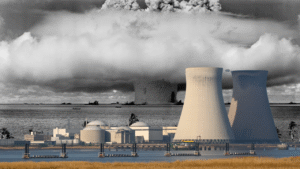
Production of Nuclear Energy
- Predictive Maintenance: Proactive maintenance strategies help assure the smooth running of equipment by using AI algorithms and sensors. AI supervision of reactor conditions at Vogtle in Georgia augments safety measures while simultaneously reducing downtime (World Nuclear Association).
- Operational Efficiency: Power output is constantly updated taking into consideration the diverse array of real-time data like weather and consumer traffic. AI also met expectations with over 5% enhancement to efficiency during a pilot project conducted at Kaiga Atomic Power Station in India (IAEA Bulletin).
Nuclear Safety and Security
- Anomaly Detection: Employing AI technologies to detect potentially operational or security breaches as irregular activities. The IAEA applies AI for enhanced non-proliferation treaty compliance verification and safeguarding verification (IAEA Publications).
- Robotic Inspections: Inspections performed by robotic devices help to shield workers from the dangers of radiation. The robotic devices used to inspect the reactor vessels by Westinghouse Electric Company are powered by AI, which increases safety and accuracy of the processes (Foro Nuclear).
Nuclear Medicine
- Image Analysis: AI systems are augmenting imaging technologies such as PET scans by aiding in the earlier diagnosis of cancer. In a 2020 study published in Nature Medicine, AI systems were proven to outperform radiologists in the detection of lung tumors (Nature Medicine).
- Personalized Treatment: Recent IAEA projects published on the IAEA News showed that AI tailored radiotherapy by altering treatment plans to suit individual patients, thus improving outcomes while minimizing detrimental effects (IAEA News).
Advantages of AI in Nuclear Technology
The incorporation of AI technology into the field of nuclear technology has the following benefits:
- Reduction in Expenses: Predictive maintenance and operational efficiency increases save nuclear plants up to 10% in operational budget (World Nuclear Association).
- Improved Safeguards: Anomaly detection as well as real-time monitoring reduces risks of accidents. Control room functions where AI is implemented improve error rates as on-the-job errors in AI-performed tasks, critical to nuclear operations, are reduced.
- Environmental Sustainability: Optimized fuel consumption and minimized waste result in cleaner energy production. This upholds low-carbon aspirations and designates nuclear energy as a crucial contributor to sustainable energy initiatives.
- Advances in Medicine: The use of AI in nuclear medicine improves the precision of diagnosis and customizes treatment, leading to earlier disease detection and better overall patient care.
| Profit | Effect |
|---|---|
| Cost Savings | Predictive maintenance cuts operational cost by 10%. |
| Improvements in Safety | Less accidents due to real-time monitoring and anomaly detection. |
| Environmental Sustainability | Reduction of waste and improved fuel preservation aids low-carbon energy hierarchy. |
| Cutting-Edge Medicine | Enhances precision in diagnosis and therapy within the domain of nuclear medicine. |
Concerns and Risks Outlined
Potential transformative nature is recognized, but the following risks and ethical concerns arise with the application of the technology:
System Dependability
- Impact: The impact of AI failures and cyberattacks on nuclear power plants would be catastrophic. Ensuring dependability requires strong guarantees in the form of preventive measures and thorough validation (Foro Nuclear).
- Mitigation: Robust security and rigorous testing.
Nuclear Autonomy
- Impact: AI application to nuclear weapons systems, particularly those involving independent decision-making, presents serious risks. The Nuclear Threat Initiative (NTI) claims that fully autonomous systems pose risks of inadvertent escalation and advocate for a constructive moratorium on their development until more is understood about the technology (NTI Analysis).
- Mitigation: Bans on fully autonomous systems.
Transparency and Accountability
- Impact: Certain AI algorithms, especially some deep learning models, have a “black box” issue which makes opaque model decisions very difficult to explain. This is a challenge in trust and explainable AI (XAI) for nuclear applications that require safety and reliability (PMC Review).
- Mitigation: Development of explainable AI (XAI).
| Risk | Potential Consequence | Mitigation Strategy |
|---|---|---|
| System Reliability | Catastrophic failures or cyberattacks. | Robust security and rigorous testing. |
| Autonomy in Weapons | Unintended escalations or misuse. | Bans on fully autonomous systems. |
| Trust | AI decisions are not trusted. | Development of explainable AI (XAI). |
Future Outlook
Nuclear technology is set to benefit from enhanced AI capabilities – AI is poised to make a highly positive impact on the nuclear sector.
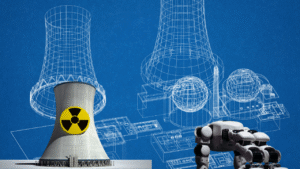
Small Modular Reactors (SMRs)
These reactors are more compact and flexible than traditional ones, making them easier and more cost-efficient to operate. AI is already being used by NuScale Power to enhance the efficiency and safety of SMRs (NPR Article).
Powering AI Data Centers
The nuclear power industry is gaining traction as a reliable, low-carbon energy producer because of the AI data center’s huge power consumption. This is exemplified by Google’s agreement with Kairos Power to power their data centers with small nuclear reactors (BBC News).
Strategic Investment
The IAEA and national laboratories are investing in AI in reactor design, medicine, and other nuclear infrastructure. This focus on AI in nuclear medicine in a 2022 IAEA project demonstrates its leading role to change the focus (IAEA News).
Cutting-Edge XAI Advances
Progress on trust in XAI (PMC Review) is already being done, which helps in trust and reliability improvement.
Expert Opinion
Jeremy Renshaw from Electric Power Research Institute (EPRI) mentions AI as an emerging sector of interest: “There is legitimate excitement about what generative tools can do. Existing models are very powerful, and there is currently a lot of effort to develop new and better tools” (IAEA Bulletin). This reflects the sense of responsibility AI shows towards nuclear innovations balanced with a positive outlook.
Actionable Insights
Experts in the areas of technology, health, energy, international security, as well as policymakers, should pay closer attention to the use of AI in applications of nuclear technology. Learn more about the transformative power of technology by visiting the IAEA Website or other related publications.
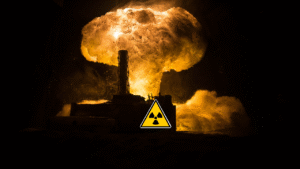
Internal Links
These links connect to relevant content within the hypothetical website to improve user engagement, reduce bounce rates, and boost SEO.
Placement: Within the “Environmental Sustainability” point under “Advantages of AI in Nuclear Technology.”
Context: Links to an article exploring small modular reactors (SMRs), which are mentioned in the “Future Outlook” section. It provides deeper insight into SMR technology and its synergy with AI.
Placement: Within the “Small Modular Reactors (SMRs)” subsection under “Future Outlook.”
Context: Links to a broader article on AI’s role in renewable energy, complementing the discussion of AI’s environmental sustainability benefits in nuclear technology.
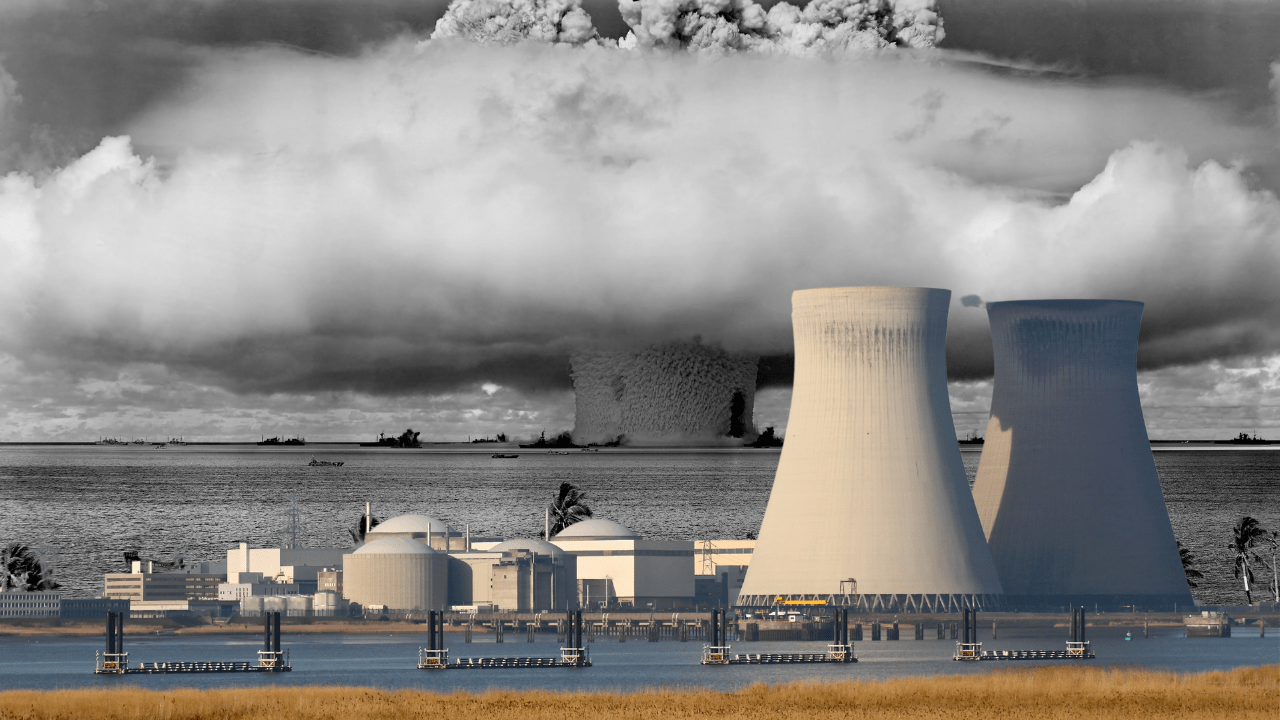






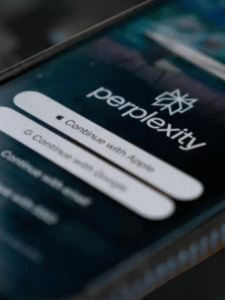











Post Comment